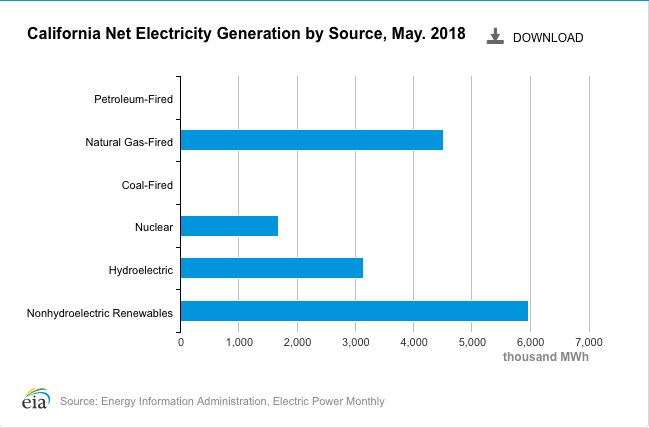On Wednesday evening, California's Senate passed SB 100, a bill mandating that utilities serving the state move to 100 percent carbon-free energy by 2045. If the Governor signs the bill into law, it will become one of the most most aggressive in the nation, matching only Hawaii's carbon-free by 2045 commitment.
California's bill specifies that any energy obtained outside the state can not contribute to additional greenhouse gas emissions from that state. The stipulation preemptively closes a potential loophole in which California could acquire cheap energy from polluting plants in border states.
The bill also ratchets up the California's previous carbon-free energy plan, such that the state will have to move to 60 percent carbon-free energy by 2030 rather than 50 percent by 2030.
The bill has been on the table for months as lawmakers reviewed cost and feasibility studies. According to the Los Angeles Times, support for the bill gained momentum in recent weeks as officials emphasized that California would essentially lead the nation in responses to climate change. The argument comes as the Trump Administration has abdicated leadership on environmental issues, renouncing the Paris Agreement and offering a Clean Power Plan replacement this month that would do little to curb carbon dioxide emissions.

California has the biggest state economy in the nation and the second-largest fuel demand, so a bill like this is significant. Currently, the Energy Information Agency (EIA) reports that "natural gas-fired power plants generated about half of California's total in-state net electricity generation in 2016. Another two-fifths of the state's net electricity generation was from renewable resources, including hydropower."
The state recently moved to retire its nuclear reactors at San Onofre, but the EIA writes, "Reductions in California's hydroelectric generation and nuclear capacity and generation have been largely made up for by renewable generation."
In California's largely Democratic Assembly, not everyone from the party was onboard with the idea. Republicans, too, opposed the bill on cost grounds. According to the LA Times, Assemblyman Steven Choi (R-Irvine) objected “Why would this body come out now and further increase costs on struggling California families?”
But other members of the Republican party backed the bill. Former Governor Arnold Schwarzenegger "sent a letter to lawmakers Monday backing the bill, and argued that Trump administration policies rolling back federal efforts to combat climate change made it all the more urgent," the LA Times wrote.
California Governor Jerry Brown has not yet made a public statement on whether he will sign or veto the bill.
[contf] [contfnew] 
Ars Technica
[contfnewc] [contfnewc]







